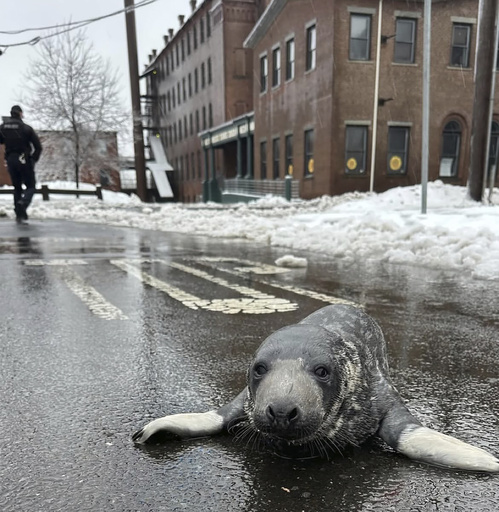
NEW HAVEN, Connecticut — A baby seal, underweight and in distress, has found refuge at an aquarium after being rescued from the streets of Connecticut, close to Yale University.
On Sunday afternoon, a concerned citizen alerted the New Haven Police Department after noticing what appeared to be an injured seal. Officer Christian Bruckhart, serving as a spokesperson for the police, reported that the animal was found over 1,000 feet away from its nearest river habitat.
Bruckhart humorously remarked, “We assumed he was here to try the clam pizza but I can’t confirm that, we’re just happy he’s safe,” in an email regarding the incident.
The police officers remained with the seal until it could be transported to the Mystic Aquarium in Mystic, Connecticut, where it would undergo rehabilitation.
On Tuesday, local police officers visited the seal at the aquarium, observing the dedicated staff working diligently to help the seal gain the necessary weight for a safe release. Plans are in place for the seal’s return to the wild in a more protective environment, potentially along the eastern coastline, yet still relatively close to its original location, as stated by Bruckhart.
Believed to be around five to six weeks old, the gray seal had already been spotted at least twice by aquarium personnel prior to its rescue, as per reports from local TV station WTNH. Staff had attempted to relocate the seal to a beach; however, it inexplicably made its way back into the urban area, likely driven by its instincts to escape from potential threats associated with water and other seals.
Gray seals inhabit the coastal waters of the North Atlantic and typically enjoy a diet of fish, crustaceans, squid, octopuses, and occasionally seabirds, as noted by the National Oceanic and Atmospheric Administration. At birth, they usually weigh around 35 pounds (16 kilograms) and, within the first few weeks of life, can gain approximately 3 pounds (1.4 kilograms) each day.

